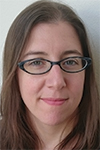Kristina Olson
2016 Janet Taylor Spence Award
 Kristina Olson
Kristina Olson
University of Washington
depts.washington.edu/uwkids
Please briefly describe your research interests.
My research interests focus on how young children learn to divide the world into social categories and how they discover their place within those categories. While I spent many years focused on groups like race and social class, most recently, I’ve begun a larger longitudinal study of transgender children. I also conduct research on early prosocial behavior and have dabbled in working to understand how people think about ownership.
What was the seminal event, or series of events, that led you to an interest in your award-winning research?
A series of fortuitous events led me to my new line of work on transgender youth development. First, my long-standing interest in children’s social categories led me to wonder about the experiences of transgender children — what are the implications of feeling like you are in a social category that, at least initially, no one else believes you to be in? How does the rejection or affirmation of that identity influence a child’s life? In addition to this long-standing interest, I had a close friend whose child was transgender, and as I began to read literature on the topic, I discovered that most research on gender-diverse youth has come from a more clinical tradition, despite identities being inherently social and developmental experiences. This interest was percolating to the top of my research priority list right as I was moving to the University of Washington, where I had funds to start a new project. At the same time, more and more families were becoming public about their children’s transgender identities, and the public had a growing interest in transgender people. It was really the culmination of these forces, combined with support from my mentors and students, which allowed me to tackle what is without a doubt the hardest and most public-facing project I’ve worked on to date.
Tell us about one of the accomplishments you are most proud of within this area of research. What factors led to your success?
I think my proudest achievement within this area has been recruitment. When I started this project, I dreamed that I would one day find 50 families of transgender children who would agree to participate in a long-term study about their families. We have now more than tripled that number, and in the process have logged visits to more than 25 states. I think sheer will on behalf of my extraordinary team is to thank for this accomplishment. My students and staff have traveled at all hours of day and night, stayed in pretty lousy hotels, subsisted on popcorn and peanut butter, and have not been paid very well — all so that we could do this work. Their hard work, along with the faith of families who sign up to participate, is why we’ve had such success.
What contributions, or contributors, to psychological science do you feel have had a major impact on your career path?
I think my work has been really fortunate to exist at the time it does — a time when interdisciplinary research is being celebrated in psychological science. I’m confident that the work I find myself doing now simply could not have happened at another time. My work builds on the tightly controlled, beautifully designed research in cognitive and social–cognitive psychology (much of which I learned from my undergraduate mentors, Roddy Roediger and Alan Lambert), as well as the nascent but prolific work at the intersection of social and developmental psychology (much of which has happened because of my graduate mentors, Mahzarin Banaji, Liz Spelke, and Carol Dweck, as well as my early colleagues and mentors, Karen Wynn and Paul Bloom). Additionally, my work has been inspired by research that is informed by public discourse on social issues (e.g., everything from Kurt Lewin’s action research to modern work on police brutality). Without these people, and these scientific traditions, I would not be able to do the work I do.
What questions do you hope to tackle in the future?
In the next few years, I plan to tackle questions about the long-term impact of early affirmation or denial on a child’s identity and well-being. I also hope to expand my work on early gender understanding to broader ranges of people — children who are intersex, those who have fluid gender identities, and children in other cultures with gender identities we don’t yet recognize in the United States. Further, I want to understand how a child’s sense of place within a social category influences that child’s perceptions of other categories. I’m sure I’ll never get to fully answer these questions, but I hope my lab’s work can make a dent in them.
What does winning this award mean to you both personally and professionally?
To me, this award is recognition of the work of a much larger group of people than just me. Even though technically my name is on it, I think it’s an award for my research group, as I wouldn’t have had the early career I did if they hadn’t been there. This award is most gratifying because it is a reflection of the opportunity to work with such a tremendous group of graduate students, postdoctoral researchers, staff, and undergrads since I started as a faculty member. I think they are incredibly deserving of this award and I’m excited to share it with them.

